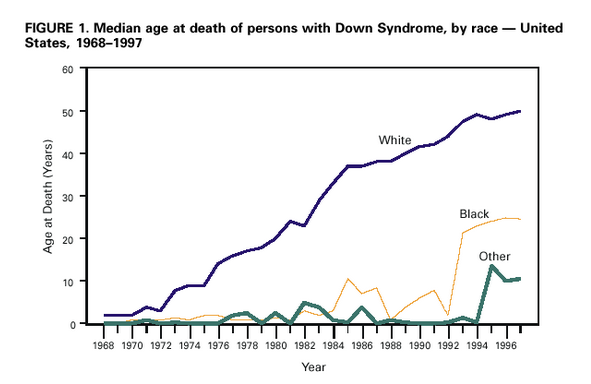- Black people are more likely to be targeted by police because of racial profiling; but also
- Black people are more likely to be involved in a crime because of the social impact of fatherlessness, poverty, poor educational opportunities and drugs
and also where
- Police are in the front lines of dealing with the fallout from a broken society; but also
- Police are over-militarized and under-trained; and
- Police are bringing their own baggage to situations, which can easily escalate
In other words, the events which led to the death of Michael Brown are in the context of a long chain of events, where neither he nor Darren Wilson are either fully innocent or fully guilty. It is society itself which must do the work of healing both racial injustice (both from within and without) and police brutality.
==========
Disability prejudice, likewise, exists in a societal context which devalues those who are seen to fall short.
This morning I followed this link, posted by the mother of a little girl with Down syndrome. It is the story of a (different) mother who has just given birth after years of infertility treatments, several miscarriages, and the loss of newborn twins. While most of the comments expressed congratulations for the birth and sympathy for the earlier losses, some were judgmental:
And not to be snarky, but what's wrong with adoption? Why do people feel such a strong need to have a biological child? If you have problems with fertility, maybe you should consider taking an unwanted child? Why go through all the heartache and expense, not to mention what it did to your body? Seems a little weird to me, that's all.To which someone responded that this couple had in fact considered adoption, and linked to an earlier post, here. Curious, I read this as well. Turns out that their idea of adoption was the conventional desire for a "healthy newborn that looks like us," which generally involves a long, long wait and/or high expense (even while pouring both money and time into IVF). As a young couple, it is reasonable for them to be hesitant about older-child adoption. However, when I read this:
We decided that we were okay with certain physical problems (cleft lip/palate, blindness or deafness, missing limbs) but not others (Cerebral Palsy, etc). We also decided we are not okay with mental disabilities (Down’s Syndrome, Fetal Alcohol Syndrome, etc). Sound selfish? Sure. We get that a lot, even from our closest friends and family. Of course we know that there are lots of older/special needs kids who need homes, and of course we know that those children are harder to place than healthy newborns. That doesn’t mean that taking an older and/or special needs kid is right for our family. Right now, our family needs a healthy baby. An older and/or special needs kid needs things that we just can’t provide.
I could not help but wonder about the thought process. They had already dealt with extreme prematurity, in term of the twins they had lost. The risk of brain damage and consequent Cerebral Palsy is very high in premature infants, and yet they persisted in pursuing high-risk pregnancies. If they cannot provide "things" that a special needs kid needs, what would they have done if they had given birth to one? For that matter, what if their beautiful, perfect baby is diagnosed next month with a special need that was not detected in utero? What if she is in an accident that leaves her disabled? What if she turns out to be autistic? There are no guarantees. Could they "provide" for their child then?
That said, I am not judging her, nor would I post this as a comment on her page. Her decision process was, as I said above, conventional. It took place in the context of prevailing social attitudes about disability. Social attitudes which are demonstrated by parents "grieving the diagnosis," whether it comes pre- or post-natally. Where expectant parents smile and say "as long as it's healthy," without considering the implication of that statement for a baby who fails to meet that standard.
It is society which must change. Just as we seek to create a society where individuals are not devalued on the basis of their race, we also should create a society where all children are valued, not judged as deficient according to arbitrary standards before they take their first breath.
Are you with me?
